

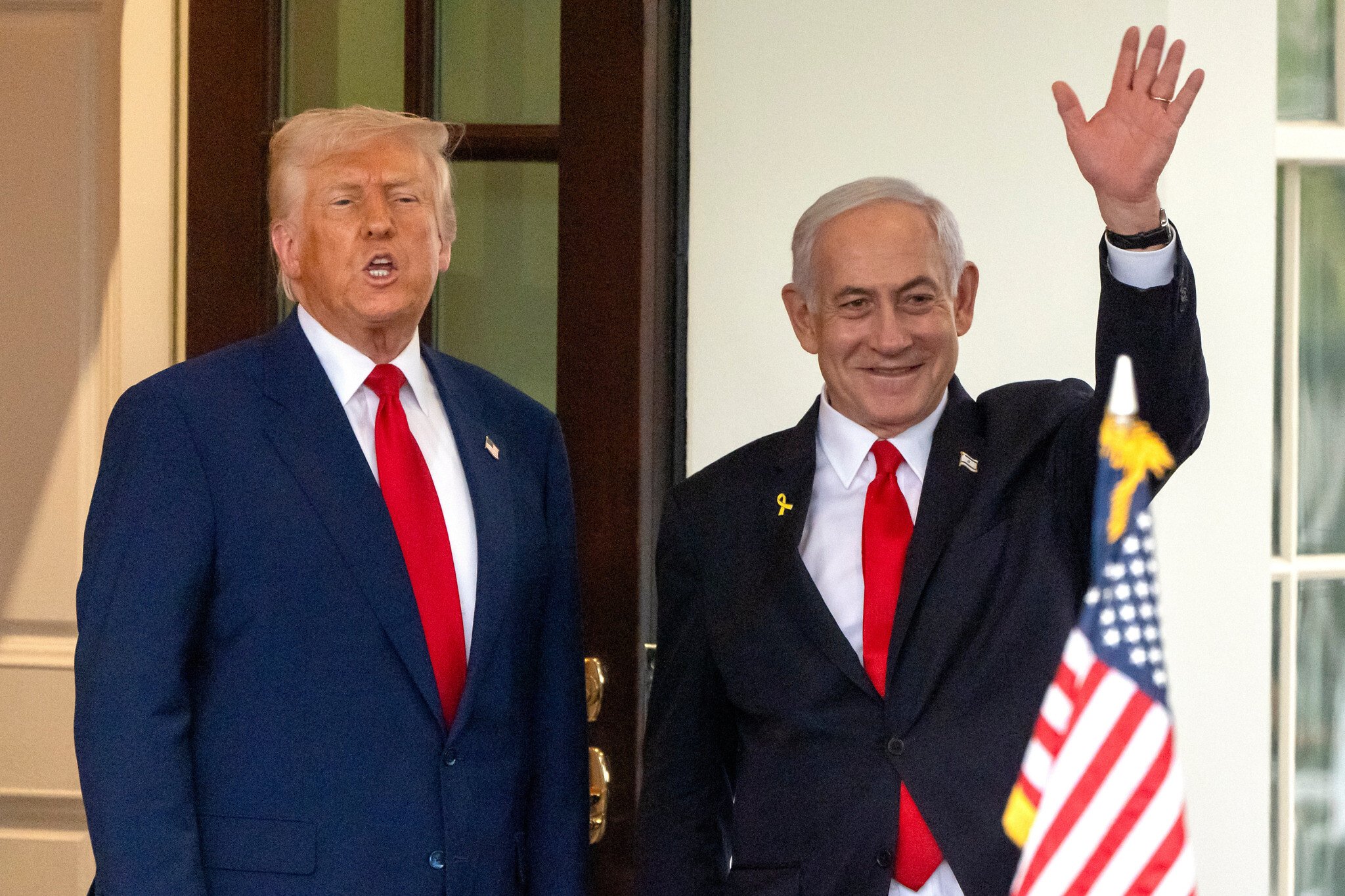
Autumn rain fell briefly on Hostages Square in Tel Aviv on Thursday morning. Despite the clouds hanging gray and low over Israel’s coast, the mood was anything but dark.
As hostage families and their supporters finally allowed themselves to smile after two years of anguish, the downpour seemed to wash away at least some of the anger and pain that marked the war that broke out with Hamas’s invasion of southern Israel two years ago.
Assuming there is no eleventh-hour surprise that blows up the process, Israelis will welcome their 20 living hostages home, and see the return of most of the bodies of the 28 dead captives. The historic event is slated to unfold just ahead of the Simchat Torah holiday, the second anniversary of the attacks according to the Hebrew calendar.
If the deal moves ahead to its second phase, with Hamas replaced by an independent Palestinian governing body and credibly disarmed, this campaign will be remembered as one of Israel’s most complete victories, two years after its most deadly debacle. It was a long, bloody slog that frustrated both those on the left and right, but it will have met Israel’s war aims, and could lead to many more achievements for Israel in the future. Israel’s deterrence will be strengthened, its enemies badly weakened, and its confidence restored.
A third phase could well be a wave of normalization agreements with Arab and Muslim states — again, if everything progresses according to US President Donald Trump’s vision, which is far from guaranteed.
Say what you will about his style and his disdain for diplomatic — and some would say, democratic — norms, but no one but Trump could have brought this deal together at this time. Leaning heavily on his distinctive brand of deal-making, obstinately focused on the big picture and not the frustrating details, Trump managed to get disparate and even hostile actors like Qatar, Turkey, and Pakistan, together with Prime Minister Benjamin Netanyahu’s Israel, behind his 20-point plan to end the war — all this a month after Israel had carried out an unprecedented attack on Hamas leaders in Qatar’s capital.

Former Israeli ambassador to the US Michael Oren called it “one of the most elegant pieces of diplomacy in recent years.”
Even once Trump had the entire Western-oriented bloc in the Middle East lined up behind his plan, there was no guarantee that talks in Sharm el-Sheikh would bear fruit. Hamas seemed to treat Trump’s ultimatum as Israel’s starting point in negotiations, and risked dragging talks back to the hostage-release-for-end-of-war dynamic that led nowhere in previous rounds.
But from Washington, Trump continued to insist that a deal would be signed soon, threatening Hamas if they didn’t agree to it. That push, along with firm pressure on Hamas from Qatar, Turkey, and Egypt, likely kept Hamas from further prevaricating.
It’s not at all the most important aspect of the agreement, but it’s hard to imagine a better candidate for the Nobel Peace Prize than Trump. The ceasefire, if it holds, will save the lives of 20 hostages, avoid the thousands of Gazan casualties that continued IDF operations would inevitably bring about, and open the door for a range of long-term processes that could well result in more countries normalizing ties with Israel and greater stability in the region.

Netanyahu, too, deserves some belated credit for his war leadership after his utter failure on October 7, 2023. In the face of domestic and international pressure, he insisted throughout that he could achieve the twin goals of toppling Hamas and freeing all the hostages.
For much of the war, he managed to make progress — albeit in lurching, uneven steps — on both of the goals, badly weakening Hamas while getting the majority of the hostages home.
Yet it seemed like the tension between the goals would win out once Hamas understood it was down to the last group of hostages earlier this year. They represented the terror group’s ticket to survival, and there appeared to be no way to free them without acknowledging that Hamas would remain a powerful, and likely armed, force in Gaza.

And it looked as if Netanyahu was letting the diplomacy around the war spiral badly out of his control. The disastrous decision to announce that Israel was stopping all aid shipments into Gaza in March not only failed to bring Hamas any closer to surrendering, but it also sparked a global campaign around the idea that Israel was starving Gazans to death, while galvanizing Israel’s allies to recognize a Palestinian state and push for an end to the war.
Arab and Muslim countries lined up against Israel after the failed strike on Hamas leaders in Doha in September. Trump criticized the attack publicly, and there seemed to be a real chance that Hamas could use the opportunity to eke out a deal that left it poised to revive itself and renew its war against Israel from Gaza in the coming years.
Though disagreements surfaced, Netanyahu and his team, especially Strategic Affairs Minister Ron Dermer, managed to keep Trump aligned with Israel’s core goals. Even unpleasant surprises like Trump’s April announcement that he was opening talks with Iran on its nuclear program didn’t derail the relationship.
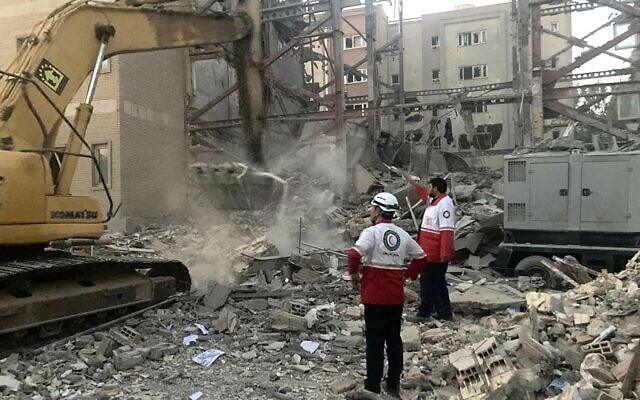
Netanyahu’s bold decision to go to war against Iran in June not only knocked Tehran’s nuclear and ballistic missile programs back significantly, but it also did wonders for his personal relationship with the US president.
Israel’s successes in degrading Iran’s air defenses and eliminating its military leaders opened the door for Trump to look tough and judicious with his use of military force. His Operation Midnight Hammer lasted only a few hours at the end of that war, involved no ground troops, and saw the US sustain no casualties. Unlike his predecessors, Trump can say, his operations in the Middle East did not come at significant cost, and did not drag on with questionable purpose.
During Netanyahu’s Washington visit shortly after the 12-day war, Trump, Defense Secretary Pete Hegseth, and US Secretary of State Marco Rubio were clearly basking in the afterglow of the strikes, and Netanyahu’s visit — along with his gift of a B-2 bomber-shaped mezuzah case — gave them new opportunities to wax at length about the operation in front of cameras.
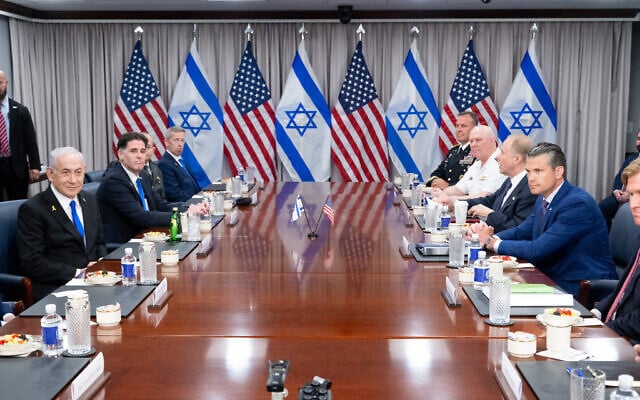
Trump likes a winner, and Netanyahu looked like one.
The trust accrued during the operation would prove key in getting beyond the subsequent Doha debacle, and in making sure that Trump’s plan adequately reflected Israel’s concerns, even if it took some pressure from the White House last week to get Netanyahu over the finish line.
Netanyahu will also feel that his military approach was vindicated. The overall campaign was inconsistent, slow, and often lacked an operational logic. In the end, however, he overruled top generals who consistently called for a more phlegmatic approach in Gaza, and settled on a sufficiently aggressive push into Gaza City to get Hamas to accept extremely unfavorable terms.
Israel has enjoyed further benefits from the way the deal unfolded. It came as France was leading its own diplomatic charge at Israel’s expense. Half of Europe followed in President Emmanuel Macron’s footsteps in recognizing a Palestinian state in September, as did Australia and Canada.
Yet those countries had absolutely no influence on the proceedings in Sharm el-Sheikh. The French initiative will likely be remembered as a curious footnote, if at all.

Choosing an adversarial stance against Israel froze those countries out of the process to end the war, whereas Trump’s embrace of Israel allowed him to bring about the result that the world so desperately wanted.
Egypt, on the other hand, emerges a winner. First of all, it can look ahead to the likely opening of trade routes up the Red Sea and through the Suez Canal, and to a rise in tourism to the country. Both are crucial sources of foreign currency in a time of severe economic crisis. And while Qatar has been positioning itself for years as Washington’s indispensable mediator in the Middle East, and has further cemented its place in Trump’s affections, it was Cairo that oversaw the talks that produced the agreement that could end the war.
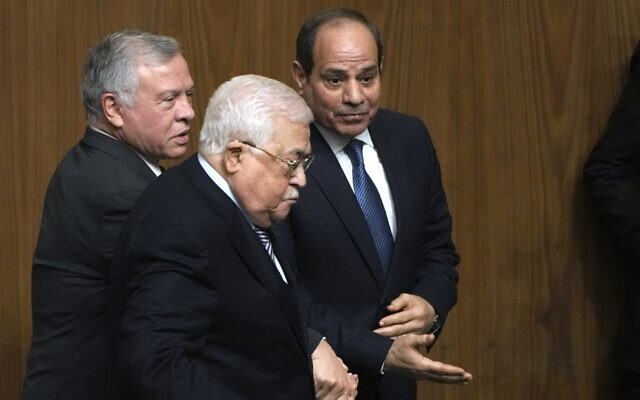
That is another positive development for Israel. While Qatar and Turkey, the other regional powers at the table, represent a bloc ideologically aligned with the Muslim Brotherhood and Hamas, Egypt sees the movement as an existential threat. It also maintains deep security and energy ties with Israel, and while the bilateral relationship is far from warm, Jerusalem will be far better off if Cairo’s influence grows at the expense of Doha’s and Ankara’s.
Despite the good vibes in Hostages Square and the unfolding victory in Gaza, subsequent stages contain plenty of question marks and potential pitfalls.
Even if the first phase of the deal — the hostage and prisoner releases, the IDF redeployment — moves forward smoothly, the second phase will be even harder to implement. There is no clarity on what Hamas disarmament looks like, how it would happen, and who would verify it.
Israeli leaders might be hoping for an international peacekeeping force in Gaza, but Israel’s history with such initiatives leaves everything to be desired. In the Sinai and in Lebanon, international peacekeepers did next to nothing to prevent attacks on Israel, and got in the way of Israel’s response.
Having Emirati or Saudi soldiers in Gaza might seem like a recipe for security, but it would more likely be the source of tension. If any of their soldiers were wounded or killed by Israeli operations, leaders in Abu Dhabi and Riyadh would face public demands to punish Israel diplomatically in some way. If Israel identified an emerging threat in Gaza and decided to operate, there would be no guarantee that peacekeepers would simply move out of the way.
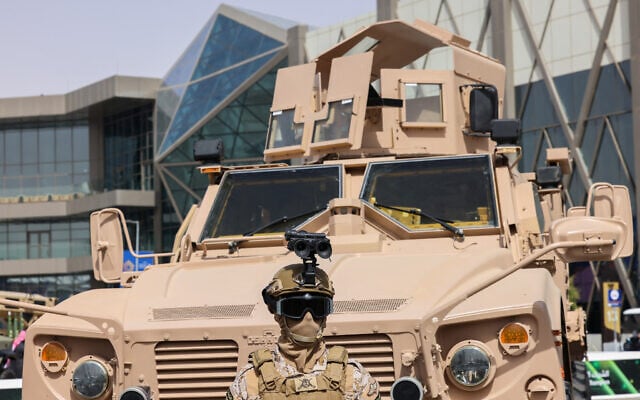
Finally, Turkey — whose leader routinely compares Israel to Nazi Germany and calls Hamas a legitimate resistance group — has insinuated its way into the heart of regional efforts to end the war in Gaza and create a day-after plan. It also says it will be involved in a multinational force to find slain hostages in Gaza.
There is an opportunity for Israel to use the postwar planning to patch up ties with Ankara to some extent. But there is a greater danger for Israel as the Turkey-Qatar axis replaces the Iranian one that Israel beat back — and the emerging bloc enjoys the firm backing from the White House.
Still, those challenges lie some ways down the road. For the next few days, at least, Israelis can hopefully get ready to welcome the return of their loved ones, prepare to bury those who have been killed, and look ahead to the start of a truly new season.

